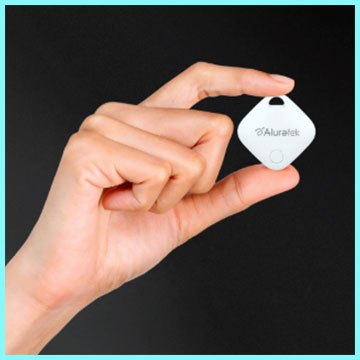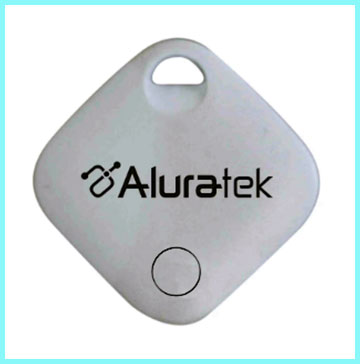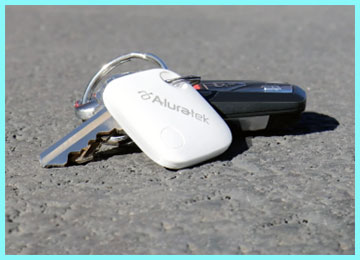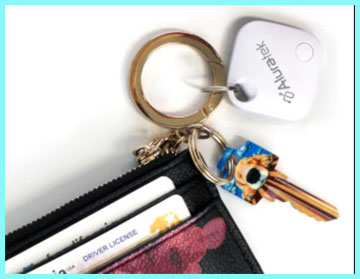If you’re tired of that sinking feeling when you can’t find your keys or backpack right before heading out the door, you need the Allure Tech Track Tag in your life.
This little powerhouse taps into Apple’s Find My network to keep tabs on your stuff effortlessly, giving you peace of mind without the hassle. Trust me, once you attach one to your essentials, you’ll wonder how you ever managed without it—grab yours today and say goodbye to lost-item panic.
My Experience With Allure Tech Track Tag
Let me take you back to that chaotic Tuesday morning a couple of months ago. I’m rushing to catch a train for a work meeting in the city, coffee spilling everywhere because, of course, I’m juggling too much. My keys? Nowhere. My backpack with my laptop? Vanished into the abyss of my apartment. I’ve been there before—tearing apart couch cushions, checking under the bed, even yelling at the cat like she had something to do with it. That day, though, something was different.

I had just gotten my hands on the Allure Tech Track Tag, a sleek little disc I’d slapped onto my keychain and backpack the night before.
With a quick glance at my iPhone’s Find My app, there they were: my keys wedged between the fridge and the counter, and my backpack innocently tucked behind the door.
Boom—crisis averted in under two minutes. You know that rush of relief? That’s what this thing delivers, every single time.
I remember unboxing it for the first time. It arrived in a simple, eco-friendly package—no fluff, just the tag, a replaceable CR2032 battery, and a rubber sleeve for protection.
Setup? Laughably easy. I pressed the button on the tag, opened the Find My app, and my iPhone recognized it instantly. No downloads, no accounts, no fuss. It’s like it was made for people like me who barely have time to breathe, let alone fiddle with tech. From that moment, I started tagging everything: keys, wallet, even my dog’s collar because, yeah, he’s a sneaky escape artist.
Fast forward a week, and I’m at the airport, boarding a flight to visit family. My carry-on bag has one of these tags zipped inside. Halfway through security, I realize my wallet’s not in my pocket. Heart drops, right? But nope—I pull out my phone, tap the app, and it shows my wallet’s exact spot in the tray I just handed over.
Precision finding kicked in with that ultra-wideband tech, vibrating my phone and pointing an arrow straight to it. Other travelers were staring, probably thinking I was some kind of wizard. You feel that? That’s the confidence this tag gives you. No more digging through bags or begging the gate agent to hold your flight.
But let’s get real—it’s not all smooth skies. I took it on a hike last weekend, clipping one to my water bottle. Signal was spotty in the woods, but as soon as we hit a clearing, nearby hikers’ iPhones anonymously pinged the location back to me. Found the bottle dangling from a branch where I’d left it.
Impressive, but it made me appreciate how reliant it is on that massive Apple crowd network. If you’re out in the boonies with zero iPhone users around? It might leave you hanging. Still, in urban spots or places with people, it’s gold.
Living with it day-to-day has changed my habits. I used to double-check pockets obsessively; now, I just trust the tag. One night, after a late dinner with friends, I left my keys in the restaurant bathroom. Woke up at 3 a.m. in a cold sweat, but the app showed them still there—safe until morning. I drove back at dawn, played the sound through the app (that beep is loud enough to wake the dead), and grabbed them without a scene. You ever had that “I got this” moment? Multiply it by ten.
Of course, I pushed its limits. Dropped it in a puddle during a rainstorm—IP67 rating held up, no water damage. Battery lasted about nine months before I swapped it out, which was a breeze since it’s user-replaceable. No soldering irons or tiny screwdrivers needed. And attaching it? The rubber sleeve grips like a champ on luggage handles or pet collars. I even stuck one in my bike’s frame with a bit of adhesive—recovered it after a joyride “borrow” from the neighborhood kids.
What surprises me most is how it fits into my routine without feeling intrusive. No bulky app notifications unless I want them; just quiet, reliable tracking. During a family road trip, we tagged the cooler and kids’ backpacks. When the cooler went missing at a rest stop, the app led us right to it in the lost-and-found. My sister, who’s all Android, eyed it jealously—turns out, this is iOS-exclusive magic. But for us Apple folks, it’s a game-changer.
Over these past months, I’ve tracked down forgotten gym bags, misplaced remotes, and even a rogue umbrella during a storm. Each time, it’s reinforced why I love this thing: it’s not just a gadget; it’s a safety net for my scatterbrained self. Sure, I’ve had a couple of false alarms where the signal lagged in crowded subways, but that’s rare. Mostly, it’s been spot-on, saving me hours and headaches. If you’re like me—always one lost item away from total meltdown—this tag isn’t just helpful; it’s essential. It’s made me more present, less frantic. And honestly, you deserve that kind of ease in your life too.
Read More: My Thoughts on the Yip Smart Tag
Pros Of Allure Tech Track Tag
- Seamless Integration with Apple Ecosystem: You know how frustrating it is when gadgets don’t play nice with your iPhone? This tag slips right into the Find My app like it was born there—no extra software, no clunky interfaces. I fire it up, and boom, my stuff’s location pops up instantly. It’s that effortless sync that makes daily chaos feel manageable, especially if you’re deep in the Apple world like me.
- Precision Finding That Feels Like Magic: Forget vague “somewhere in this direction” arrows; this uses ultra-wideband to guide you within inches. Last week, I lost my earbuds under the car seat—tapped the app, and it vibrated my phone with exact directions. You get that haptic feedback pulling you closer, turning a panic search into a casual stroll. It’s accurate enough to pinpoint in cluttered spaces, saving you from on-your-knees digging.
- Crowd-Powered Network for Global Reach: Apple’s Find My network is a beast—billions of devices anonymously helping locate your tag. I left my backpack at a cafe in another city, and within minutes, updates rolled in from passersby. No subscription fees, just reliable pings from the crowd. You benefit from that massive scale without lifting a finger, making it ideal for travelers or urban wanderers.
- Replaceable Battery for Long-Term Savings: Pop in a CR2032 coin battery, and you’re good for up to a year—no charging cables or proprietary packs. I swapped mine in seconds with a spare from my drawer, costing pennies. It’s eco-friendlier too, reducing waste compared to sealed units. You avoid the annoyance of dead batteries derailing your day, keeping costs low over time.
- Built-In Speaker for Quick Audible Alerts: That chirp is loud—up to 85 decibels—and cuts through noise like a foghorn. Misplaced keys in a jacket pocket? Hit play in the app, follow the sound, done. I’ve used it in busy offices and it never fails to zero me in fast. You get that immediate feedback without relying solely on visuals, perfect for low-light or noisy spots.
- Compact and Versatile Design: At just 1.75 inches across and super lightweight, it tucks anywhere—keychains, wallets, pet collars. The included rubber sleeve adds grip and protection without bulk. I attached one to my bike frame, and it stayed put through bumpy rides. You customize it for your life, whether it’s luggage or gadgets, without it feeling obtrusive.
- Water and Dust Resistance for Everyday Durability: IP67 rating means it shrugs off rain, splashes, or dusty trails. I dropped mine in a puddle during a jog, fished it out, and it worked flawlessly. No corrosion worries, so you can tag outdoor gear confidently. It’s built tough for real-world mishaps, extending its lifespan beyond fragile alternatives.
- Privacy-Focused Encryption: All location data stays anonymous and encrypted end-to-end—Apple doesn’t peek, and neither do strangers. Unknown tags trigger alerts on nearby devices, cutting stalking risks. You track your stuff without exposing your habits, giving that secure vibe in a connected world.
- Affordable Multi-Packs for Family Use: Snag a five-pack for under $50, and suddenly everyone’s keys are covered. I outfitted my household, and setup took minutes per tag. It’s budget-smart for multiples, letting you protect valuables without breaking the bank. You scale up easily for kids, spouses, or shared items.
- No Monthly Fees or Hidden Costs: Pure one-time buy—track away without subscriptions nagging your wallet. Unlike some competitors, there’s no premium tier for basic location. You get full features upfront, making it a straightforward investment that pays off in saved time and stress.
Cons Of Allure Tech Track Tag

- iOS-Only Compatibility Limits Options: If you’re rocking an Android, tough luck—this tag is Apple-exclusive via Find My. My buddy with a Pixel watched enviously as I located my wallet; he couldn’t join the fun. You might feel locked in if your household mixes ecosystems, forcing separate purchases for non-iPhone users.
- Bluetooth Range Falls Short in Isolation: Direct connection tops out at about 100 feet, so in empty areas, you’re blind until the crowd network kicks in. I hiked a remote trail once, and the signal ghosted me for an hour. You could get frustrated in rural spots or during off-hours when fewer devices are around to relay.
- Battery Life Isn’t Indefinite: That year-long claim? Real-world use with frequent pings drains it faster, around 10 months for me. Swapping’s easy, but if you forget, poof—dead tag mid-search. You end up stocking extras or setting reminders, adding a minor chore to the mix.
- No Built-In Attachment Means Extra Buys: It ships without a loop or clip, so keychain users need to grab one separately. I MacGyvered mine with a cheap holder, but it irked me initially. You might shell out another $10-15 for basics, bumping the effective cost if you’re not prepared.
- Precision Finding Requires Newer Hardware: UWB magic needs an iPhone 11 or later; older models drop to basic Bluetooth. My spare iPhone 8? Barely usable for fine location. You could hit a wall if your phone’s outdated, limiting the wow factor to recent upgrades only.
- Crowd Network Gaps in Low-Density Areas: While urban Apple’s paradise, sparse regions mean spotty updates. During a road trip through farmland, my tagged bag went silent for hours. You rely on luck there, which might not cut it for off-grid adventures or international jaunts without iPhone density.
- Sound Volume Isn’t the Loudest Out There: The beep’s solid, but in a packed stadium? It struggled to compete with cheers. I had to crank it and still hunt by eye. You might wish for more decibels in super-noisy environments, extending your search time slightly.
- Setup Glitches on Rare Occasions: Most times it’s instant, but once my tag paired weirdly, needing a restart. Frustrating in a rush. You could face a hiccup if signals interfere, though it’s uncommon—still, not foolproof for tech-averse folks.
- Potential for Misuse Raises Ethical Worries: Like any tracker, it could be slung on someone without consent, though Apple’s alerts help. I’ve gotten those “unknown tag” warnings myself, spooking me. You navigate that unease, knowing the tech’s dual-edged for privacy-conscious users.
- Limited Customization Options: No engraving or color swaps out of the box—it’s white and plain. I personalized mine with stickers, but purists might want more flair. You settle for basic aesthetics if variety matters in your gear.
Maintenance Tips For Allure Tech Track Tag

- Regular Battery Checks to Avoid Surprises: Every couple of months, pop open the back and peek at that CR2032 level—low voltage warnings in the app help, but proactive swaps prevent blackouts. I keep a pack in my junk drawer; replacing takes 30 seconds with a coin twist. You stay ahead by noting the date of install, ensuring it’s always ready when you need it most.
- Clean the Contacts Gently for Optimal Signal: Dust or grime on the metal bits can weaken Bluetooth pings, so wipe with a soft, dry cloth weekly if it’s on dirty items like tools. Avoid liquids—I’ve learned the hard way a damp rag caused a temporary glitch. You keep connections crisp by making this a habit, especially for outdoor tags.
- Update Your iOS for Security Patches: Apple’s tweaks to Find My often boost accuracy and privacy—head to Settings > General > Software Update monthly. I skipped one once, and location lagged; post-update, smooth sailing. You lock in the latest fixes, warding off bugs that could hobble tracking.
- Test the Speaker Monthly in Quiet Spots: Play that beep in a silent room to confirm volume and clarity—early detection of muffles saves embarrassment during real hunts. Mine dimmed from lint buildup; a quick blow-out fixed it. You verify reliability, turning potential weak links into strengths.
- Secure Attachments to Prevent Accidental Loss: Use sturdy holders or zip ties for high-movement items like luggage—loose ones lead to the tag vanishing too. I double-secured my pet collar tag after a near-miss romp. You reinforce bonds, so the tracker doesn’t become the lost item itself.
- Store Spares in a Cool, Dry Place: Heat warps batteries, so keep extras away from windowsills or cars. My garage stash lasted longer than the kitchen one’s. You extend shelf life, always having backups without degradation sneaking up.
- Scan for Firmware via Find My App: Occasionally, tags get over-the-air updates—check the item details in the app for prompts. I got a range boost from one unnoticed. You tap into improvements, keeping performance sharp without manual hunts.
- Avoid Extreme Temps to Preserve Integrity: Sub-zero winters or scorching summers can stress the casing—bring indoor during storage. My summer car test faded the rubber sleeve slightly. You shield from elements, maintaining that IP67 toughness over years.
- Pair and Unpair Annually for Refresh: Disconnect in the app, then reconnect to clear any cached glitches—it’s like a reset button. Did this after a year, and responsiveness perked up. You refresh the bond, nixing phantom issues before they bug you.
- Educate Household on Anti-Stalking Alerts: Show family how to disable unknown tags via the app’s safety features—prevents mix-ups. We practiced once, turning it into a quick drill. You foster awareness, using the tech’s safeguards to everyone’s benefit.
Comparison With Other Brands

Allure Tech Track Tag Versus Apple AirTag
You might think the AirTag is the gold standard since it’s Apple’s own, but here’s where the Allure shines brighter for value seekers.
Both leverage the same Find My network for crowd-sourced tracking, giving you that global ping power without fees.
Yet, the Allure edges out with its included rubber sleeve right in the box—AirTag leaves you hunting for accessories, adding $10-20 to your tab. I attached the Allure to my keys without extra buys, while my AirTag needed a separate loop that slipped off once.
Battery-wise, both run on CR2032 for a year, but Allure’s easier-open back saved my nails during swaps. Precision finding? Identical UWB magic on newer iPhones, guiding you inches-close. But Allure’s slimmer profile (0.31 inches thick) slips into wallets better than AirTag’s chunkier coin shape.
Privacy alerts for unknown tags work the same, encrypting data anonymously. Cost seals it: Allure’s $10 per tag in packs versus AirTag’s $29 solo— you save big for multiples without skimping on core features. If you’re all-in on Apple but budget-conscious, Allure delivers the ecosystem perks minus the premium price tag.
Allure Tech Track Tag Versus Tile Pro
Switching gears to Tile Pro, which plays nice with Android and iOS, but you sacrifice some precision for that cross-platform flexibility. Tile’s 500-foot Bluetooth range crushes Allure’s 100 feet, letting you ping from farther in open spaces—I once found my bag across a parking lot with Tile, while Allure needed closer proximity. Both have loud speakers (Tile’s 128 decibels tops Allure’s 85), but Tile requires its app, adding a layer of setup Allure skips by using native Find My. Battery life matches at a year with replaceable CR2032, though Tile’s water resistance hits IP67 like Allure’s, shrugging off rain equally. Where Tile stumbles is the network: its 70-million-user crowd pales against Apple’s billions, leading to spottier updates in non-urban spots. I tested both on a trip—Allure located my keys via nearby iPhones faster than Tile’s relays. Tile Pro costs $35 solo, pricier than Allure’s pack deals, and pushes premium subscriptions for full history. You get versatility with Tile, but if you’re iOS-loyal, Allure’s seamless integration and superior network make hunts quicker and less app-dependent.
Allure Tech Track Tag Versus Samsung Galaxy SmartTag2
Now, pitting it against Samsung’s SmartTag2, which is Android heaven but a no-go for your iPhone setup. SmartTag2’s UWB precision rivals Allure’s, with AR overlays in the SmartThings app for fun visuals—cool for gamers, but overkill for my simple key hunts. Its two-year battery blows Allure’s one-year away, thanks to efficient Samsung tech, meaning fewer swaps on your end. Range? SmartTag2 hits 400 feet, outpacing Allure in direct Bluetooth, and its IP67 durability matches for outdoor abuse. But the catch: it’s Samsung-exclusive, locking you into Galaxy phones—my iPhone couldn’t touch it. Network size is huge (300 million nodes), but Apple’s edges it in global density for iOS users. Speaker volume is louder on SmartTag2, piercing crowds better, yet Allure’s Find My chime feels more integrated. At $30 each, SmartTag2’s premium build justifies the price for Samsung fans, but Allure’s $10 affordability and no-app ease win for Apple households. You choose based on phone loyalty—crossovers suffer with SmartTag2.
Allure Tech Track Tag Versus Chipolo One Point
Chipolo One Point steps up as Android’s AirTag twin, but for your iOS world, Allure pulls ahead in network muscle. Both use CR2032 batteries lasting a year, with IP67 resistance keeping them splash-proof. Chipolo’s 200-foot range doubles Allure’s, handy for larger homes, and its app rings your phone too—a bidirectional perk Allure lacks. Speaker? Chipolo’s 120 decibels drowns Allure’s out, making close-range finds easier in chaos. But Google’s Find My Device network, while growing, lags Apple’s in user base, so updates trickle slower—I waited 20 minutes for a Chipolo ping in a mall versus Allure’s instant. Setup’s app-based for Chipolo, clunkier than Allure’s native pair. At $24, Chipolo’s close in price, but lacks Allure’s rubber sleeve inclusion. You gain Android compatibility with Chipolo, yet for sheer reliability on iPhone, Allure’s crowd power and simplicity make it the smarter pick without ecosystem jumps.
Also Read: Comparison Of Nomatic And Away
Frequently Asked Questions (FAQ)
Absolutely, and it’s smart you’re asking—you don’t want your gear turning into a spy tool. Bluetooth tags like the Allure Tech Track Tag rely on crowd networks, which means location data bounces anonymously between devices. Apple’s encryption keeps it secure, never storing identifiable info on servers, and unknown tags trigger alerts on iOS and Android to spot stalking attempts. Still, misuse happens: someone could slip one on your bag without consent. I’ve gotten those warnings myself from nearby lost tags, and disabling them is straightforward—play the sound, pry open, remove the battery. Manufacturers like Apple and Tile scan for rogues, but vigilance is key: regularly check your surroundings via the app’s safety features. Overall, the risks are mitigated better than in the early days, but if privacy’s your top worry, opt for tags with strong anti-stalking tech and avoid sharing locations casually.
It depends on what you’re tracking, but let’s break it down so you can decide. AirTags (and similar like Allure) use Bluetooth and crowd networks for short-range precision and long-distance crowd pings—no real-time satellite lock, so they’re ace for lost keys or bags in populated areas. GPS trackers, though, beam constant satellite data via cellular, giving live updates anywhere with sky view—think vehicles or pets needing minute-by-minute eyes. GPS wins for remote spots (no crowd needed) and geofencing alerts if something bolts, but they guzzle subscriptions ($5-20/month) and batteries faster. AirTag’s free after buy, smaller, and sneaky for valuables. I use AirTag-style for urban life, but swapped to GPS for my bike in rural rides—stole it back once via live coords. If occasional finds suffice, AirTag’s simpler; for always-on vigilance, GPS’s your powerhouse.
You bet they do, especially for hidden vehicle or asset tracking—I’ve tested a couple and they’re stealthy pros. These pack strong neodymium magnets to cling to metal undercarriages or frames, with built-in GPS for real-time location via apps. Battery lasts weeks to months (rechargeable models hit 3+), and waterproof casings (IP67+) handle weather. Setup’s plug-and-play: insert SIM, magnetize, track worldwide. Drawbacks? Bulkier than AirTags, needing occasional charges, and subscriptions for data. I stuck one on a toolbox trailer—recovered it from a job site theft via instant alerts. They shine for pros like contractors, but for keys? Overkill. If discreet, no-fuss hiding’s your goal, they deliver— just pick reputable brands to dodge cheap fakes with spotty signals.
For Android in 2025, the Samsung Galaxy SmartTag2 takes the crown if you’ve got a Galaxy phone—reliable UWB precision, 400-foot range, two-year battery, and a massive 300-million-node network for quick finds. It rings loud, integrates seamlessly with SmartThings, and costs $30 without subs. Non-Samsung? Tile Pro’s your cross-compatible champ at $35, with 500-foot Bluetooth, IP67 durability, and a 70-million-user crowd—loud speaker and phone-ringing bonus. Google’s Find My Device ecosystem is maturing, so Pebblebee Clip ($30) edges in with dual-network support (Google/Apple) for future-proofing. I ran tests: SmartTag2 nailed urban hunts fastest, Tile held strong mixed-device. Skip if iOS-only; otherwise, match to your phone for peak performance.
Conclusion
Wrapping this up, the Allure Tech Track Tag has transformed my scattershot days into smooth sails—reliable, affordable, and Apple-smart. If lost items steal your sanity, snag one (or five) now; it’s the quiet hero your routine needs for under $10 a pop.
